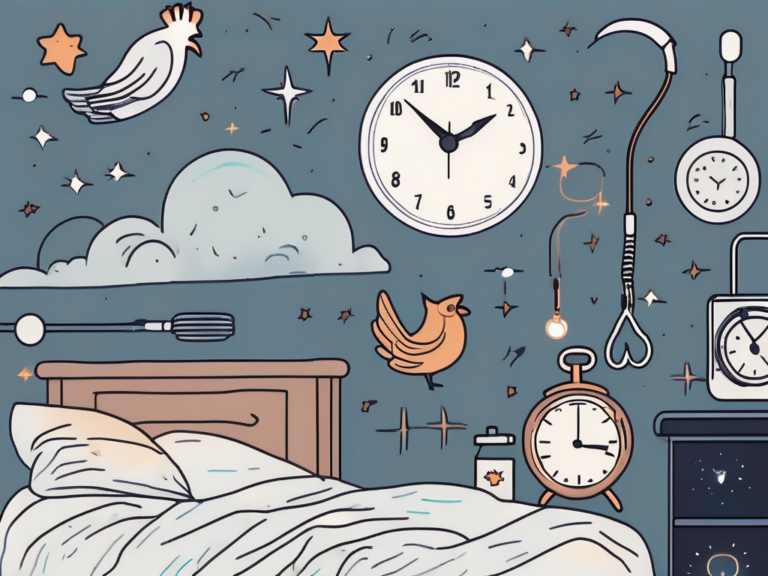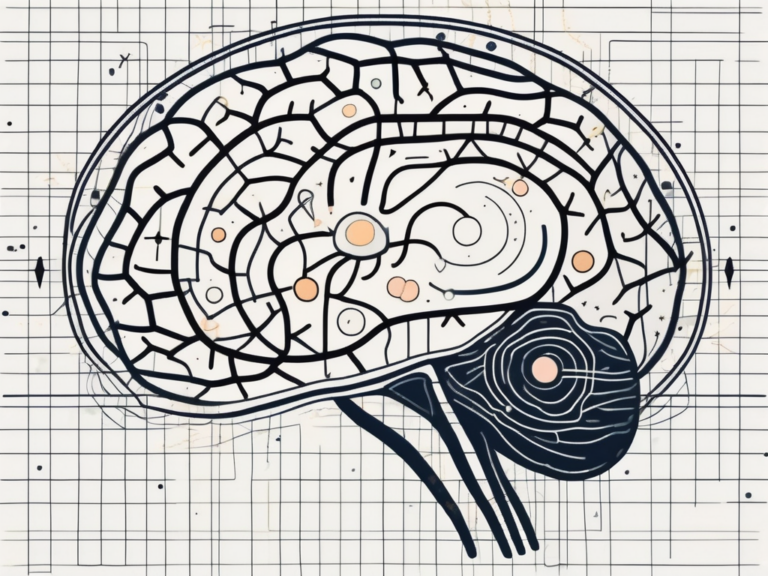Tips for Improving Sleep Patterns When You Wake Up
Getting a good night’s sleep is essential for our overall well-being. When we wake up feeling refreshed and rejuvenated, we are better equipped to tackle the challenges of the day ahead. However, many of us struggle with poor sleep patterns, leading to fatigue and decreased productivity. In this article, we will explore various strategies for improving sleep patterns when you wake up, as well as discuss the impact of disrupted sleep and techniques for falling back asleep.
Understanding Your Sleep Cycle
Before we delve into tips for improving sleep patterns, it is important to understand the nature of sleep itself. Sleep occurs in cycles, which consist of different stages. These stages are characterized by varying levels of brain activity and physiological changes.
Now, let’s take a closer look at the science behind sleep patterns. During a typical sleep cycle, we go through several stages, including light sleep, deep sleep, and Rapid Eye Movement (REM) sleep. Each stage plays a crucial role in the restorative process, allowing our body and mind to recover from the day’s activities.
Light sleep, also known as NREM Stage 1, is the initial stage of sleep where our brain activity slows down, and our muscles relax. This stage acts as a transition from wakefulness to deeper sleep. As we progress into NREM Stage 2, our brain waves become slower, and our body temperature drops. This is the stage where our body begins to repair and regenerate tissues, supporting physical recovery.
Deep sleep, or NREM Stage 3, is the stage where our brain waves slow down even further, and it becomes difficult to wake up. This is the most restorative stage of sleep, where our body repairs muscles, strengthens the immune system, and promotes overall physical growth. It is during this stage that the body releases growth hormone, which is essential for tissue repair and development.
Lastly, we have REM sleep, which is characterized by rapid eye movements and increased brain activity. This stage is when most dreaming occurs and is crucial for cognitive functions, memory consolidation, and emotional regulation. During REM sleep, our brain is highly active, and our muscles become temporarily paralyzed, preventing us from acting out our dreams.
Now that we have a better understanding of the different sleep stages, let’s move on to identifying your sleep pattern type. Everyone has a unique sleep pattern, influenced by their individual circadian rhythm and lifestyle factors. Understanding your sleep pattern type can help you tailor strategies to improve your sleep quality specifically. Some individuals are natural “early birds,” waking up and feeling most alert in the morning, while others are “night owls,” preferring to stay up late and feeling more productive during nighttime hours.
By identifying your sleep pattern type, you can optimize your sleep routine and create an environment that supports your natural tendencies. Whether you’re an early bird or a night owl, implementing strategies that align with your sleep pattern can lead to better sleep quality and overall well-being.
The Impact of Disrupted Sleep
Disrupted sleep can have serious consequences on our overall health and well-being. Let’s explore the physical and mental health effects of poor sleep.
Physical Health Consequences of Poor Sleep
Poor sleep patterns can have adverse effects on our physical health. Studies have shown that chronic sleep deprivation is associated with an increased risk of obesity, heart disease, diabetes, and weakened immune function. It can also impair our ability to regulate appetite and contribute to hormonal imbalances.
When we don’t get enough sleep, our body’s ability to process glucose is compromised. This can lead to insulin resistance, a condition where our cells become less responsive to insulin, resulting in elevated blood sugar levels. Over time, this can increase the risk of developing type 2 diabetes.
In addition to metabolic changes, poor sleep can also affect our cardiovascular system. Research has found that sleep deprivation can lead to an increase in blood pressure and heart rate, putting extra strain on the heart. This can contribute to the development of cardiovascular diseases such as hypertension and heart disease.
Mental Health Consequences of Poor Sleep
Not only does disrupted sleep impact our physical health, but it also affects our mental well-being. Lack of sleep can lead to mood disturbances, increased irritability, difficulty concentrating, and decreased cognitive function. It can also contribute to the development or exacerbation of mental health conditions such as anxiety and depression.
When we don’t get enough sleep, our brain’s ability to process emotions is compromised. This can result in heightened emotional reactivity, making us more prone to experiencing negative emotions such as anger, sadness, and frustration. It can also impair our ability to regulate our emotions, leading to mood swings and a decreased ability to cope with stress.
Furthermore, sleep deprivation can have a significant impact on our cognitive abilities. It impairs our attention, memory, and problem-solving skills, making it harder to focus and perform tasks efficiently. This can have a negative impact on our productivity, academic performance, and overall quality of life.
Strategies for Improving Sleep Patterns
Now that we understand the importance of healthy sleep patterns and the consequences of disrupted sleep, let’s explore strategies for improving our sleep quality.
Sleep is not just a state of rest; it is a vital process that allows our bodies and minds to recharge and rejuvenate. However, creating a sleep-friendly environment is essential to ensure that we get the quality sleep we need. A conducive sleeping environment plays a crucial role in promoting healthy sleep patterns. Here are some tips to create an ideal sleep environment:
- Ensure your bedroom is cool, quiet, and dark. A cool room temperature, around 65 degrees Fahrenheit (18 degrees Celsius), can help facilitate better sleep. Use blackout curtains or an eye mask to block out any unwanted light, and consider using earplugs or a white noise machine to drown out any disruptive sounds.
- Invest in a comfortable mattress and pillow. The right mattress and pillow can make a world of difference in your sleep quality. Choose a mattress that provides adequate support for your body and a pillow that aligns your head and neck properly.
- Avoid electronic devices before bed. The blue light emitted by electronic devices like smartphones, tablets, and laptops can interfere with our natural sleep-wake cycle. Try to limit your exposure to these devices at least an hour before bedtime.
- Establish a relaxing bedtime routine. Engaging in calming activities before bed can signal to your body that it’s time to wind down. Consider reading a book, taking a warm bath, or practicing deep breathing exercises to help relax your mind and body.
While creating a sleep-friendly environment is crucial, we must also pay attention to our diet and exercise habits, as they can significantly impact our sleep patterns. Here are some tips to improve sleep quality through diet and exercise:
- Avoid consuming caffeine and heavy meals close to bedtime. Caffeine is a stimulant that can interfere with sleep, so it’s best to avoid consuming it within six hours of bedtime. Additionally, heavy meals can cause discomfort and indigestion, making it harder to fall asleep.
- Incorporate regular physical activity into your daily routine. Engaging in regular exercise can help regulate your sleep-wake cycle and promote better sleep. Aim for at least 30 minutes of moderate-intensity exercise, such as brisk walking or cycling, most days of the week.
- Practice relaxation exercises, such as yoga or stretching, before bed. These gentle exercises can help relax your muscles and calm your mind, making it easier to fall asleep. Consider incorporating a short yoga or stretching routine into your bedtime routine.
By creating a sleep-friendly environment and adopting healthy lifestyle habits, we can improve our sleep quality and reap the numerous benefits of a good night’s sleep. Remember, quality sleep is not a luxury; it is a necessity for our overall well-being.
Techniques for Falling Back Asleep
At times, we may wake up in the middle of the night and struggle to fall back asleep. Let’s explore some techniques to help with this challenge.
When it comes to falling back asleep, breathing exercises can be highly effective in promoting relaxation and sleep. One technique you can try is deep breathing. Here’s how:
- Lie on your back and close your eyes.
- Inhale deeply through your nose, expanding your abdomen.
- Exhale slowly through your mouth, emptying your lungs completely.
- Repeat this breathing pattern several times, focusing on your breath and letting go of any tension or thoughts.
By focusing on your breath and engaging in deep, intentional breathing, you can create a sense of calmness that can help lull you back to sleep.
In addition to breathing exercises, practicing mindfulness can also be beneficial in calming the mind and promoting better sleep. Consider incorporating the following mindfulness techniques into your nighttime routine:
- Progressive muscle relaxation: This technique involves systematically tensing and releasing each muscle group in your body, starting from your toes and working your way up to your head. By consciously relaxing each muscle, you can release tension and promote a state of relaxation conducive to sleep.
- Meditation: Taking a few moments to engage in meditation before bed can help you cultivate a sense of presence and awareness. By focusing your attention on the present moment, observing your thoughts and sensations without judgment, you can create a mental space that is more conducive to falling back asleep.
Whether you choose to engage in deep breathing exercises or practice mindfulness techniques, finding what works best for you is key. Remember, the goal is to create a sense of relaxation and calmness that can help you drift back into a restful slumber.
When to Seek Professional Help
In some cases, improving sleep patterns may require professional intervention. It is important to recognize when to seek help from a healthcare provider.
Recognizing Chronic Sleep Disorders
If you consistently struggle with sleep patterns despite implementing various strategies, you may have a chronic sleep disorder such as insomnia, sleep apnea, or restless leg syndrome. These conditions require expert evaluation and treatment.
Treatment Options for Sleep Disorders
Depending on the specific sleep disorder, treatment options may include behavioral therapies, medication, or a combination of both. A healthcare professional can guide you through the appropriate course of action based on your individual needs.
Insomnia, one of the most common sleep disorders, can be caused by a variety of factors including stress, anxiety, and poor sleep hygiene. A healthcare provider can help identify the underlying causes of your insomnia and develop a personalized treatment plan. This may involve cognitive-behavioral therapy (CBT) to address negative thought patterns and behaviors that contribute to sleep difficulties.
Sleep apnea, on the other hand, is a condition characterized by pauses in breathing during sleep. It can lead to excessive daytime sleepiness, loud snoring, and other health complications. Continuous positive airway pressure (CPAP) therapy is a common treatment for sleep apnea, which involves wearing a mask that delivers a steady stream of air to keep the airway open.
Restless leg syndrome (RLS) is a neurological disorder that causes uncomfortable sensations in the legs and an irresistible urge to move them. Treatment options for RLS may include medication to alleviate symptoms and lifestyle changes such as regular exercise and avoiding triggers like caffeine and nicotine.
In conclusion, improving sleep patterns when you wake up is crucial for our overall well-being. By understanding the science behind sleep patterns, recognizing the impact of disrupted sleep, and implementing strategies for improvement, we can take proactive steps towards achieving a restful night’s sleep. Remember, if you continue to struggle with sleep despite your best efforts, do not hesitate to seek professional help. Prioritizing our sleep health is essential for a happier, healthier life.






